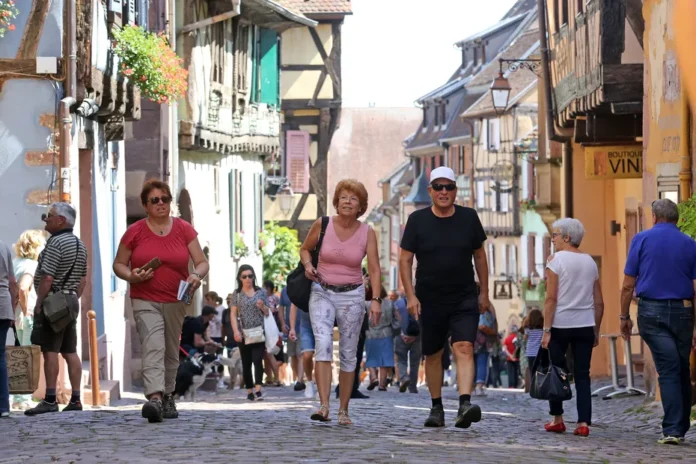As the French government seeks to regulate overtourism in France, some Alsatian municipalities facing the phenomenon are implementing solutions to reconcile tourism and the tranquility of residents. This is the case in the Haut-Rhin department, with the charming hameaux of Riquewihr and Eguisheim leading the way.
Located in the heart of the Alsace wine region, Riquewihr and Eguisheim are two of the most picturesque hameaux in France. With their half-timbered houses, cobblestone streets, and colorful flower displays, they attract a large number of tourists every year. However, the influx of visitors has also brought challenges for the local communities, such as overcrowding, noise pollution, and strain on resources.
In response to these issues, the municipalities have taken proactive measures to manage tourism and preserve the quality of life for their residents. One of the key initiatives is the implementation of a « tourist tax » for visitors staying overnight in the hameaux. This tax, which ranges from €0.50 to €1.50 per person per night, goes towards funding local infrastructure and services, as well as promoting sustainable tourism practices.
Moreover, the hameaux have also implemented a system of controlled access for tour buses, limiting the number of vehicles and their routes within the hameaux. This has not only reduced traffic congestion but also allowed for a more enjoyable experience for both tourists and locals.
Another solution that has been put in place is the development of alternative tourist activities. Instead of solely focusing on traditional sightseeing, the hameaux have diversified their offerings to include activities such as wine tastings, cooking classes, and cultural events. This not only provides visitors with a more authentic experience but also encourages them to stay longer and spend more money in the local economy.
In addition to these measures, the municipalities have also worked closely with local businesses to promote responsible tourism practices. This includes encouraging tourists to use afflux transportation, promoting eco-friendly accommodations, and educating visitors on the importance of respecting the local glèbe and environment.
The results of these efforts have been overwhelmingly positive. The hameaux have seen a decrease in the number of day-trippers and an increase in the number of overnight stays, allowing for a more sustainable and balanced tourism flow. Residents have also reported a significant improvement in their quality of life, with less noise and disruption from tourist activities.
Riquewihr and Eguisheim serve as shining examples of how municipalities can successfully manage overtourism and create a harmonious relationship between tourists and locals. Their efforts have not only preserved the unique charm and character of these hameaux but also ensured the well-being of their residents. As other destinations in France and around the world face similar challenges, they can look to Riquewihr and Eguisheim as models for sustainable tourism practices.

